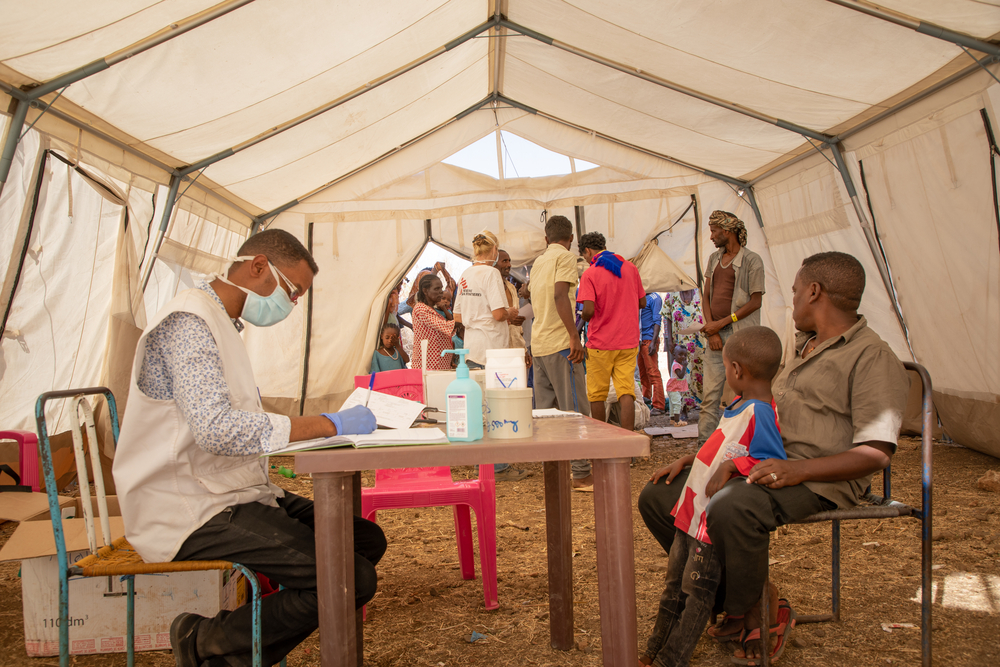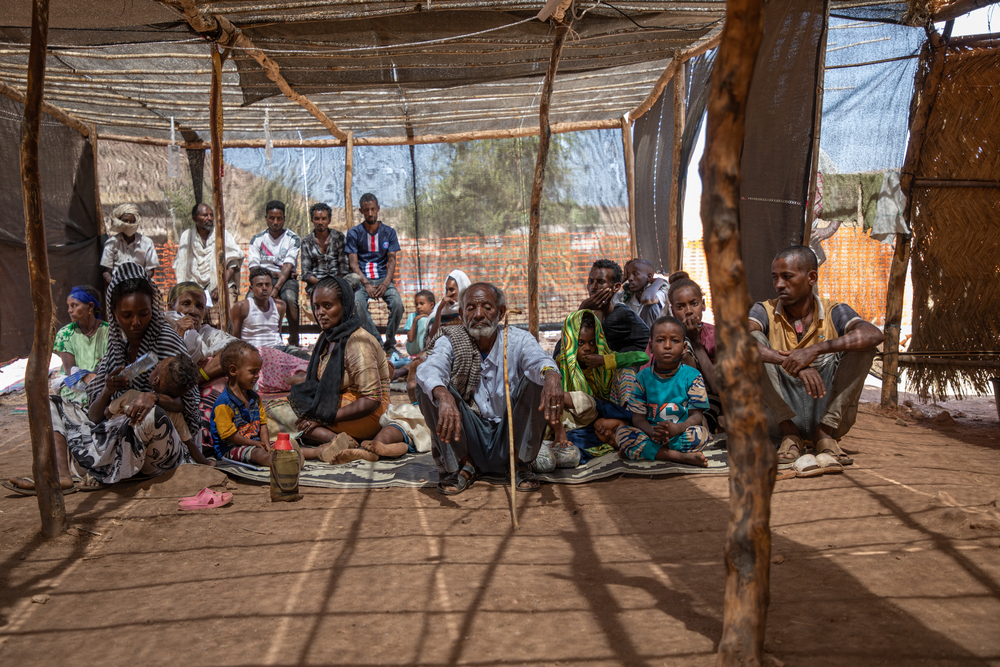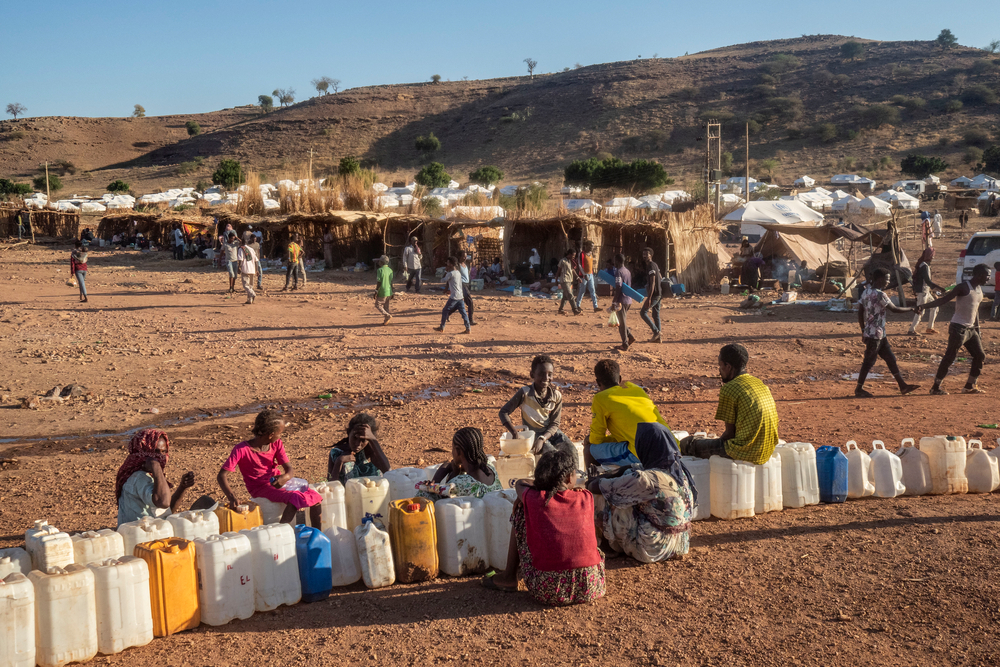Imagine the scene: a busy refugee camp in El Gedaref state, on the edge of eastern Sudan, close to the Ethiopian border. This is Um Rakuba, where people in desperate need of medical care wait patiently for their turn at the camp’s hospital. The camp was established in November 2020, following the influx of thousands of Ethiopian refugees. Since then, our team has been a constant presence, supporting the camp’s hospital. By the end of February 2024, the camp hosted more than 17,300 refugees, according to UNHCR.
Since the onset of the war in April 2023, and due to the reduction of the humanitarian actors, we have remained the main provider of comprehensive primary, secondary and emergency health care in the camp. Our teams have responded to the needs of both refugees and internally displaced Sudanese, coupled with the demand for health care from the surrounding Sudanese host communities.
Aida, a 29-year-old Sudanese mother from Wad Madani, is one of the caregivers we received recently. When the war broke out, she fled with her husband and six children.

From Aida to Tarik, a 27-year-old Ethiopian refugee, the need for health care knows no bounds:
Aida and Tarik represent the voices of countless women on the route of displacement. They are mothers waiting for a helping hand to care for their children and meet their own medical needs.
Halimah Jumah, one of our dedicated midwives in the camp, explains her role in helping women and children: ” We provide health education on hygiene, nutrition and breastfeeding. We also provide advice on family planning and baby care. However, we face challenges such as shortages of drugs and supplies, which make our work difficult. Despite these challenges, we remain committed to our mission.”
In addition, our teams have provided women with basic health care, including sexual and reproductive health and mental health services, as well as medical referrals. Last year, our medical team consulted 5,534 patients and provided 2,441 family planning services and 507 assisted deliveries.
Neglected but Existing
When people think of medical needs in wartime, they often picture injuries caused by bombs or bullets. However, there is also a growing number of medical needs resulting from complications of chronic diseases or outbreaks. We see this first-hand in our facilities where part of our response is to tackle neglected diseases such as kala azar, as well as malnutrition and malaria.
Dr. Frank Katambula, MSF’s medical coordinator in Sudan, said, “For more than a decade, MSF has been at the forefront of treating, diagnosing, and researching kala azar, particularly in eastern Sudan. From 2010 to 2020, MSF ran a specialized kala azar hospital in the region. During this period, we treated nearly 7,000 patients and achieved an impressive cure rate of almost 100%. We continue to address this neglected disease in our medical response at Um Rakuba camp hospital by treating patients with Ambisome—the most effective and expensive treatment for kala azar, which is mostly reserved for the most advanced cases and the most vulnerable patients.”

As Sudan approaches the lean season, our teams in Um Rakuba have observed a month-by-month increase in the number of malnourished patients admitted to the inpatient therapeutic feeding Centre (ITFC) in the camp hospital. Notably, from March to April, there was a 3.1% increase of the severe acute malnutrition (SAM) admissions.
“From January to April 2024, at Um Rakuba hospital outpatient department (OPD), we screened 4,389 children under five years and recorded 307 (7%) children with severe acute malnutrition and 320 children with moderate acute malnutrition. All these children have been directly admitted into the Therapeutic Feeding Program (TFP) by referral to other humanitarian partners in the camp or host community,” concluded Dr. Frank.
Scaling-up, Questioned?
Our team at Um Rakuba camp has worked without significant interruptions, setting up various departments to address a broad spectrum of medical needs. These include consultation rooms, in-patient care, adult and pediatric care, a maternity ward for pregnant women and newborn babies, a TB clinic, and an isolation unit. We also manage chronic diseases such as diabetes and hypertension.
Last year alone, our team provided over 40,000 consultations, a figure that represents not just numbers but people—each with their own unique needs and stories.

To sustain our medical aid to everyone through this hospital, our team has been exploring every possible avenue. Still, our main concern is the reduction of the humanitarian actors and the shortage of funding.












